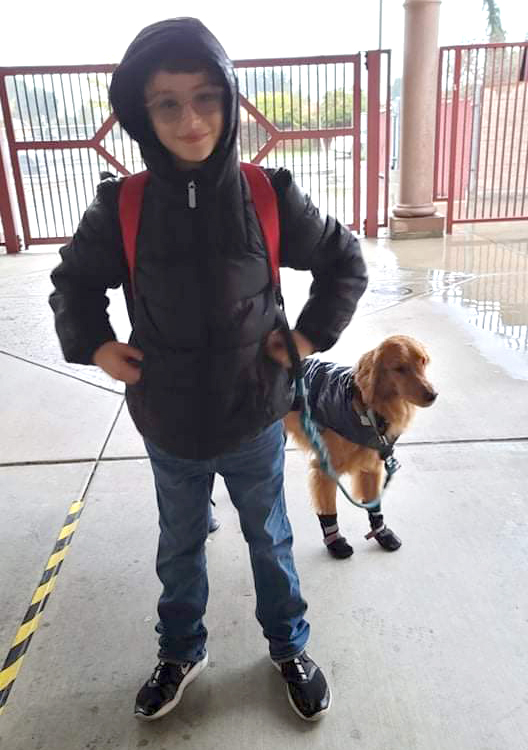When a child is diagnosed with cancer and undergoing treatment, there are typically interruptions in regular school routines. For most children, school is a place for fun, learning, socialization and normalcy. Children undergoing cancer treatment benefit from returning to school as soon as medically possible, however this can be a tough adjustment for children, their parents and even the school.

Oliver and his service dog, Lady Bug
While a lot of children look forward to going back to school, it can come with a lot of anxiety. Some fears and concerns children might have include feeling behind on their school work, changes in appearance, reactions of other children and changes in their abilities. Transitioning back to school can be overwhelming for parents as well, commonly concerned with fear of infection and excessive fatigue and that their child may be teased by classmates.
Most children’s hospitals have teachers, social workers, child life specialists or education coordinators to support families during return to school. These professionals may be willing to intercede on behalf of the family: attending meetings with the school, spending time in the classroom, helping with paperwork, and communicating special needs to the school staff.
Before your child returns to school it is important to have a meeting with the teacher, principal, and/or school nurse to ensure everyone is on the same page. Some topics to discuss include medications, special accommodations, warning signs, and emergency management should an issue arise. It is also important to provide basic information about your child’s cancer and treatment to the students in his or her class. Offer your school leaders an opportunity for you, your child, or even a member of your medical team to help answer any student questions before your child returns.
Upon returning to school, it’s normal for children to need additional support emotionally or academically than before diagnosis, and understandably so–they’ve been through a huge change in their lives. There may be new physical changes and emotional adjustments. Some treatments can affect how children learn and think. It is important to have open communication with your child and the school about any concerns they are having as they adjust back into life at school.
Most children adjust well to school after treatment, but cancer and its treatments can affect learning that can last a few months or possibly longer. Treatment can make it hard to complete tasks, focus, or remember things. Ask your child’s cancer care team about possible neurocognitive late effects from their treatment. Determine if your child would benefit from neuropsychological testing to assess possible issues with reading, math, writing, comprehension, memory, concentration, attention or fine motor skills. If challenges are identified after testing, the school has resources in place to support your child. You can request a 504 plan or IEP (Individualized Education Program) from the school to support your child in the best ways possible.
Oliver “Olly” is a 12 year old boy who has been battling Langerhans histiocytosis since he was a baby. His mother Shannan homeschooled him for preschool but has made an effort to have him attend school as much as possible once he entered kindergarten. Shannan explains “I had a lot of fear about bullying and being exposed to germs but realized it wasn’t fair to keep him home because of my fear. He needs school to develop relationships and interact with children his own age.”
Every year Olly’s mom has his doctor submit paperwork to the school confirming he has a chronic health condition that excuses him from missed days. This form ensures she doesn’t have to provide doctor’s letters every time he’s out sick. Shannan is also in constant communication with Olly’s teacher and said it’s been essential to his success. Shannan’s advice to parents is to “get everything in writing.” She also encourages parents to “advocate for your child but also involve them in the process since you aren’t in the classroom all day.”
Shannan said it’s been important for her to get Olly an IEP for academic support and a 504 plan for medical support. These plans have ensured some helpful accommodations for Olly–not sitting by the air conditioning unit, getting an extra snack, permission to use the restroom as much as needed and recess accommodations. She suggests parents set up IEP meetings at the beginning of the year, review at the end of the year and schedule an addendum meeting as a mid-year check point, so that any adjustments can be discussed with school personnel.
Transitioning back to school is important and exciting, but can be stressful. Have an open discussion with your child about fears and help them develop coping strategies. Don’t be afraid to advocate for your child and have frequent communication with the teacher and school staff. Ask for help from the hospital staff if you need extra support. Visit our website for additional practical tips on transitioning back to school. You can also find several NCCS publications like Sammie’s New Mask coloring book for friends of children with cancer and An Educational Guide for Friends of Teens With Cancer by visiting our Publications page.
The way forward isn’t always easy, but you are never alone.

